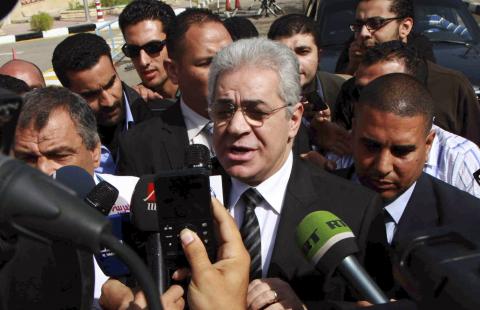Advertisement
Ex-Army Chief, Leftist To Run For Egyptian Presidency
CAIRO (Reuters) - The former army general who toppled Egypt's first freely elected president will face a leftist politician in next month's presidential election, as they were the only candidates to enter, the committee organising the vote said on Sunday.
The committee had received paperwork from former army chief Abdel Fattah al-Sisi and former parliamentarian and presidential candidate Hamdeen Sabahi, its head told a news conference, hours after the deadline for nominations had passed.
The elections will be held in a barren political climate, three years after the uprising that overthrew autocrat Hosni Mubarak raised hopes of a robust democracy in the biggest Arab nation.
There will be no Islamist candidate, in contrast to the hotly contested 2012 presidential race which featured more than a dozen rivals from across the political spectrum and was won by Mohamed Mursi of the Muslim Brotherhood.
Sisi, who deposed Mursi last year, is expected to win the vote easily. He has gained cult-like adulation from supporters who see him as a saviour who can end the political turmoil dogging the country since the army-backed popular uprising that ended Mubarak's three-decade rule.
Islamists, many of whom have been driven underground, view Sisi as the mastermind of a coup.
Thousands of them have been jailed and the Brotherhood has been banned and declared a terrorist organisation, with its top leaders facing trials. Secular activists, including ones who played a key role in the revolt that toppled Mubarak, have also been rounded up. There are no signs political tensions will ease anytime soon.
EGYPT'S CHALLENGES
Sisi would be the latest in a line of Egyptian rulers drawn from the military that was only briefly broken during Mursi's year in office.
The only other contender, Sabahi, heads a political alliance called the Popular Current and was a member of parliament under Mubarak. He came third in the 2012 presidential vote after Mursi and ex-air force chief Ahmed Shafik.
Sabahi told Reuters in an interview last month that he doubted Sisi would bring democracy if elected, alleging that as Mubarak's former chief of military intelligence he was responsible for human rights abuses.
Sabahi has said that the country has yet to cleanse a "rotten" system or create a new breed of politicians, and argues that Mubarak-era figures are making a comeback.
Human rights groups says authorities have stifled all forms of dissent.
Neither candidate has outlined a strategy for tackling the poverty, energy shortages and unemployment that afflict many of Egypt's 85 million people.
SIGNATURE TALLY
Abdelaziz Salman, secretary-general of the Presidential Elections Committee, said that Sisi had submitted 188,930 signatures endorsing his candidacy to the committee, and Sabahi had presented 31,555. The required number is 25,000.
The committee will announce the official list of candidates on May 2 for the vote on May 26-27. Campaigning will run from May 3 to 23.
The elections law notes that the winner needs to get the absolute majority of valid votes; otherwise a run-off would be held at least seven days after the first vote.
But official newspaper al-Gomhuria's early Monday morning edition quoted Salman as saying whichever candidate got 50 percent plus 1 of the valid votes cast would be the winner and there would not be a run-off.
Egypt's next president will face an Islamist militant insurgency that has gained pace since Mursi's ouster. Hundreds of members of the security forces have been killed in shooting and bombing attacks that have spread from the Sinai Peninsula to Cairo and other cities and towns. The violence has scared away tourists, a pillar of the economy.



















Add new comment